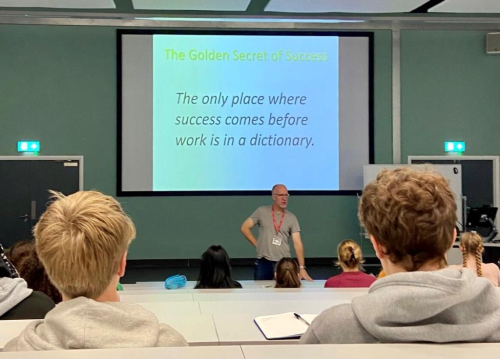Simon Hall writes:
A good friend of mine went on a date with a woman he really liked.
Like a loyal pal, I phoned the next day to see how it had gone.
Brilliant, he said.
Tell me more, I replied.
Well, he recounted, I told her all about my work, my hobbies, my life, my family, my friends, the music I like, my favourite films, where I go walking and cycling, what I’m going to do in the future, all that stuff.
Okay, I said. And what did you learn about her?
Well… Actually… Now you come to mention it… Not that much I suppose.
Sadly strongly suspecting what was coming next, I asked:
So, what happens now?
That’s the strange thing, he said. I’ve sent her a couple of messages about getting together again, but not had a reply.
I don’t suppose I need to say anything else, do I?!
So, how does my friend’s less than glorious date have any connection with the secret of a powerful presentation?
The magic ingredient is shifting from a monologue to a dialogue.
Think back on the most boring talks you’ve ever been to. What theme runs through them?
I’m guessing it’s when the presenter just talks and talks and talks, and leaves the audience no space to react, join in, think, feel, or become part of the performance.
Now recap on some of the best talks you’ve been to.
Here, I bet you did have space to feel part of the show.
In other words, it was a conversation, not just someone talking, talking, talking at you.
Those kind of performances make you want to see the presenter again.
The other kind - which also applies to dates - you very much don’t.
I’m thinking of this now because I’ve had a few days back in my beloved Devon, talking to the brilliant students at Exeter College.
We covered the secrets of success in life, and it was an absolutely uplifting session.
Here, for example, is a sneaky peaky at the number one, most important, golden secret:

(Thank you to Imogen Aires, one of the group, an aspiring doctor, for the picture.)
And why? What was the magic ingredient for such a splendid time?
It was because I didn’t just talk at the group.
Yes, I gave them some info, but then, critically, I set them a series of challenges to put that learning into action.
Whether lateral thinking, teamworking, or critical analysis…
Never more than a few minutes went by when the students weren’t playing their part.
So they got a great deal from it, as the feedback was lovely, but also enjoyed it as well, and they found the session memorable…
Which is the best combination you can get.
So, whether you’re presenting, or dating, never forget…
Conversation good, monologue bad.


